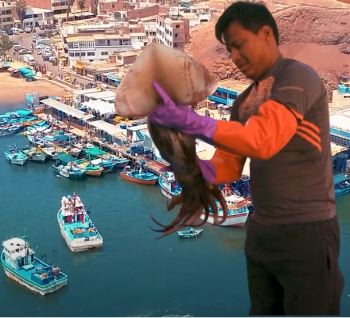|

Giant squid fishery employs more than 20 thousand artisanal fishermen and represents nearly 30% of fishing exports
Peru Protects Artisanal Squid Fishing, Targets MSC Certification
 PERU
PERU
Wednesday, February 12, 2025, 07:00 (GMT + 9)
A recent study published in the journal Nature, titled "Illuminating the multidimensional contributions of small-scale fisheries," highlights the critical role of artisanal fishing in food security, poverty alleviation, and marine ecosystem conservation.
.png)
The research indicates that artisanal fishing employs 90% of the world's fishing sector workforce and is responsible for 40% of catches, utilizing ancestral practices that minimize environmental impact.
In Peru, this model is exemplified by the squid (Dosidicus gigas) fishery, a major source of marine protein for human consumption and an economic engine for thousands of coastal families.

This fishery employs over 20,000 artisanal fishermen and accounts for nearly 30% of fisheries exports, with an annual value of up to USD 850 million.
However, its sustainability has faced threats from the use of non-selective fishing methods, such as purse seines and curtains, which damage the ecosystem and compete unfairly with traditional techniques.
Faced with this challenge, the Ministry of Production has published Ministerial Resolution No. 00051-2025-PRODUCE, reaffirming the exclusively artisanal nature of the squid fishery and reiterating that it should be carried out only with selective fishing methods, in line with scientific recommendations and industry demands.
The regulation, published on February 9, 2025, establishes that extraction is carried out by artisanal vessels using exclusively the jigging line, highlighted for its "manual and passive operation," guaranteeing a catch without significant negative impacts, according to the Peruvian Sea Institute (IMARPE).
Industry voices: union between science, industry, and artisanal fishing communities
,FIS%20Seafood%20Media.png) Alfonso Miranda, President of the Fishing and Aquaculture Committee of the SNI, celebrated the measure. Alfonso Miranda, President of the Fishing and Aquaculture Committee of the SNI, celebrated the measure.
"The ministerial resolution reaffirms three key principles: exclusively artisanal fishing, predominance of manual methods, and use of selective gear such as the jigging line. The next step for better fishery management is the publication of the Squid Fisheries Management Regulation (FMP) ", he said.
For his part, Javier Querevalú, President of the Yacipor Fishermen's Guild and member of SONAPESCAL, highlighted the importance of the initiative, noting that "the squid has been declared as f.png) ully exploited by IMARPE." ully exploited by IMARPE."
He added that "this measure minimizes the risk of disproportionately increasing fishing effort by introducing unsustainable fishing gear."
He also mentioned that the FMP project has been under discussion for a long time and was finally submitted to public consultation in October 2024.
.png)
Meanwhile, Gerardo Carrera, President of the Peruvian Giant Squid Chamber (CAPECAL), agreed on the need for prompt publication of the FMP.
"The Ministry of Production resolution ensures that extraction is carried out using an environmentally friendly fishing gear, but the general framework of the fishery needs to be refined to bring Peru closer to Marine Stewardship Council (MSC) certification, the most recognized fishing sustainability seal globally," he emphasized.
.png)
Edwin Houghton, Vice President of SONAPESCAL, highlighted the co-responsibility of all actors for the new regulations to work.
"The success of its implementation will depend on everyone. The authorities must supervise, the fishermen and shipowners must comply, and the processing plants must only source squid from legal origin. Only in this way can we show international markets that Peru offers 100% artisanal and sustainable squid," he said.
Finally, Jorge Jacinto, of the Association of Shipowners and Artisanal Fishermen of San José and member of SONAPESCAL, stressed the importance of long-term sustainability.
 "Thinking about the future is acting today. The squid fishery is approaching sustainability standards, but we must reinforce its selective and artisanal character to ensure that future generations continue to take advantage of this resource," he said. "Thinking about the future is acting today. The squid fishery is approaching sustainability standards, but we must reinforce its selective and artisanal character to ensure that future generations continue to take advantage of this resource," he said.
He pointed out that this measure not only protects the squid but represents a milestone by prioritizing artisanal fishing and valuing Peru's cultural heritage, promoting decent employment and aligning with the United Nations Sustainable Development Goals (SDGs).
In Jorge Jacinto's words: "Today, Peru shows the world that sustainability is not a slogan, but a practice." The challenge now is to maintain the pace of improvements in the fishery. To this end, the Ministry of Production has the responsibility to publish the Squid FMP promptly.
Related news:
.jpg)
editorial@seafood.media
www.seafood.media
|



